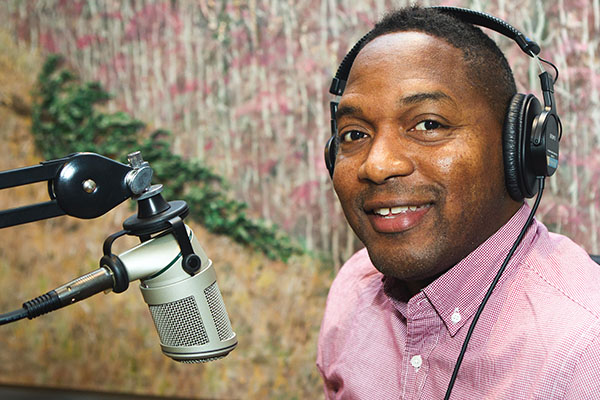Chef, author and food justice advocate Bryant Terry is a 2015 James Beard Foundation Leadership Award-winner renowned for his activism to create a healthy, just, and sustainable food system. He focuses on ways to increase access to healthy, affordable food. A lifelong learner and educator who leads by example, Terry offers practical advice about how to be mindful of ways to eat - and help others eat - differently.
Transcript
Megan Hayes: Chef, author and food justice advocate Bryant Terry is a 2015 James Beard Foundation Leadership award winner, renowned for his activism to create a healthy, just and sustainable food system. In particular, he focuses ways to increase access to healthy affordable food. Terry is the author of the critically acclaimed Vegan Soul Kitchen: Fresh Healthy and Creative African American Cuisine, which was named one of the best vegetarian/vegan cookbooks of the last 25 years by Cooking Light magazine. Terry’s fourth book Afro-Vegan was published in April 2014. In December of that year, it was nominated for an NAACP Image Award in the Outstanding Literary Work category. A lifelong learner and educator who leads by example, Terry encourages others to always be mindful of ways to eat differently. Bryant Terry, welcome to Sound Affect.
Bryant Terry: Thank you for having me on.
MH: So glad to have you here today, so let’s get started with a very basic question; what is a vegan?
BT: What is a vegan? A vegan is one who avoids any animal or animal derived products and if it were up to me I wouldn't put so much focus on vegan, my goal is to get people eating real food again, and I think the culprit which I think we all need to be aware of is this meat processed, package heavy, fatty diet that most Americans are eating and we’re seeing the effects of, particularly here in the south. So I just want people to get back to eating real food and with the Afro-Vegan concept it's just celebrating the staples and flavor profiles and ingredients from the African continent, the Caribbean and the American South and really seeing those as something that can bring health and bring life and pleasure. So in general, my approach is, let me help educate consumers, eaters, Americans and others about what's happening in our industrialized food system and what's happening with factory farming, how that's impacting animals and the environment and local economies, how eating more local, seasonal and sustainable fresh whole foods can have such a positive impact on our own personal well-being, of communities, local economies and then let people make their own decisions and they have to live with that. I want to re-contextualize and help people reimagine these things as compassionate and fun and delicious and not heavy and overly political and self-righteous.
What do you think?
Share your feedback on this story.
About Appalachian State University
As a premier public institution, Appalachian State University prepares students to lead purposeful lives. App State is one of 17 campuses in the University of North Carolina System, with a national reputation for innovative teaching and opening access to a high-quality, cost-effective education. The university enrolls more than 21,000 students, has a low student-to-faculty ratio and offers more than 150 undergraduate and 80 graduate majors at its Boone and Hickory campuses and through App State Online. Learn more at https://www.appstate.edu.












